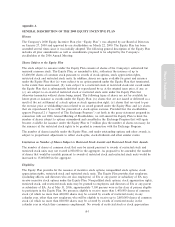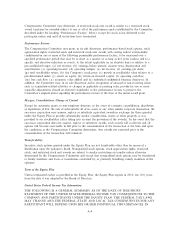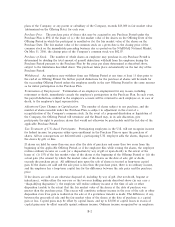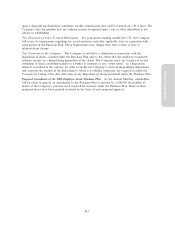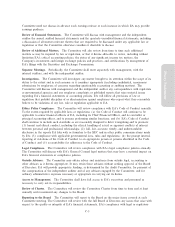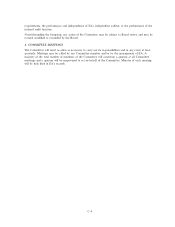Electronic Arts 2006 Annual Report Download - page 63
Download and view the complete annual report
Please find page 63 of the 2006 Electronic Arts annual report below. You can navigate through the pages in the report by either clicking on the pages listed below, or by using the keyword search tool below to find specific information within the annual report.
Appendix B
GENERAL DESCRIPTION OF THE 2000 EMPLOYEE STOCK PURCHASE PLAN
2000 Employee Stock Purchase Plan, as Amended
History. The 2000 Purchase Plan was adopted by the Board on May 25, 2000, approved by the
Stockholders on July 27, 2000, and has been subsequently amended. The following discussion describes the
material terms of the Purchase Plan, as amended to date.
Purpose. The purpose of the Purchase Plan is to provide employees of the Company with a convenient
means of acquiring common stock of the Company through payroll deductions, to enhance the employees'
sense of participation in the aÅairs of the Company and subsidiaries, and to provide an incentive for
continued employment.
Administration. The Purchase Plan is administered on behalf of the Board by the Compensation
Committee of the Board. The interpretation by the Compensation Committee of any provision of the
Purchase Plan is Ñnal and binding on all participating employees.
Eligibility. All employees of the Company (including directors who are employees), or any parent or
subsidiary, are eligible to participate in the Purchase Plan except the following: (i) employees who are not
employed by the Company on the 15th day of the month before the beginning of an OÅering Period (as
deÑned below); (ii) employees who are customarily employed for less than 20 hours per week;
(iii) employees who are customarily employed for less than 5 months in a calendar year; and
(iv) employees who, pursuant to Section 424(d) of the Code, own or hold options to purchase or who, as
a result of participation in the Purchase Plan, would own stock or hold options to purchase stock
Proxy Statement
representing 5% or more of the total combined voting power or value of all classes of stock of the
Company or any parent or subsidiary. As of May 31, 2006, the Company estimates that approximately
7,100 persons were eligible to participate in the Purchase Plan.
Participation. Each oÅering of the Company's common stock under the Purchase Plan is for a period of
one year (the ""OÅering Period''). OÅering Periods commence on the Ñrst business day of March and
September of each year. The Ñrst day of each OÅering Period is the ""OÅering Date'' for such OÅering
Period. An employee cannot participate simultaneously in more than one OÅering Period. Each OÅering
Period consists of two six-month purchase periods (each a ""Purchase Period'') commencing on the Ñrst
business day of March and September. The last day of each Purchase Period is a ""Purchase Date.''
Employees may participate in the Purchase Plan during each pay period through payroll deductions. An
employee sets the rate of such payroll deductions, which may not be less than 2% nor more than 10% of
the employee's base salary, wages, commissions, overtime, shift premiums and bonuses plus draws against
commissions, unreduced by the amount by which the employee's salary is reduced pursuant to
Sections 125 or 401(k) of the Code. Eligible employees may elect to participate in any OÅering Period by
enrolling as provided under the terms of the Purchase Plan. Once enrolled, a participating employee will
automatically participate in each succeeding OÅering Period unless such employee withdraws from the
OÅering Period. After the rate of payroll deductions for an OÅering Period has been set by an employee,
that rate continues to be eÅective for the remainder of the OÅering Period (and for all subsequent
OÅering Periods in which the employee is automatically enrolled) unless otherwise changed by the
employee. The employee may increase or lower the rate of payroll deductions for any subsequent OÅering
Period but may only lower the rate of payroll deductions during the current Purchase Period. Not more
than one change may be made eÅective during any one Purchase Period.
In any given Purchase Period, no employee may purchase more than (a) twice the number of shares that
could have been purchased with the payroll deductions if the purchase price were determined by using
85% of the fair market value of a share of the Company's common stock on the OÅering Date or (b) the
maximum number of shares set by the Board. In addition, no employee may purchase shares at a rate
that, when aggregated with all other rights to purchase stock under all other employee stock purchase
B-1




